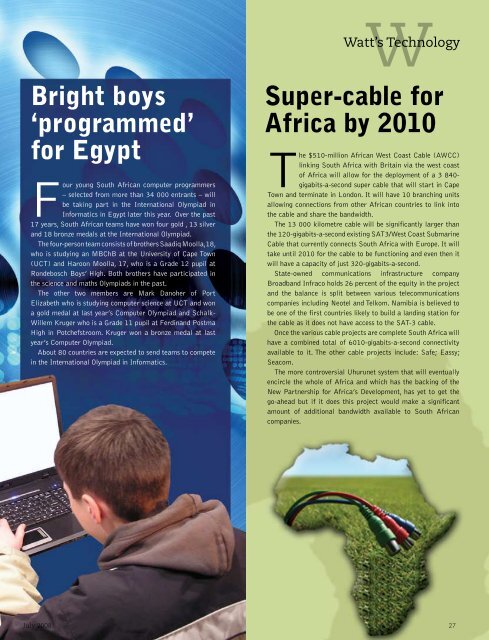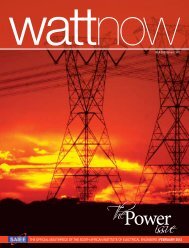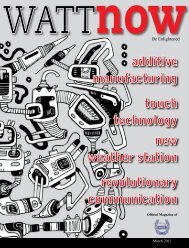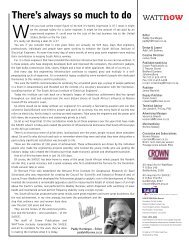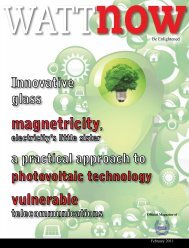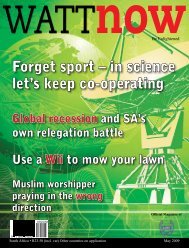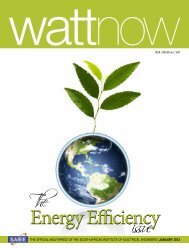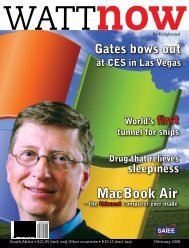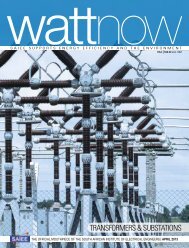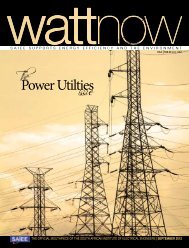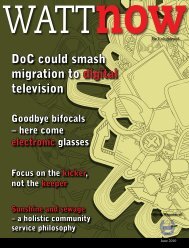Cut electricity consumption with automation - Watt Now Magazine
Cut electricity consumption with automation - Watt Now Magazine
Cut electricity consumption with automation - Watt Now Magazine
Create successful ePaper yourself
Turn your PDF publications into a flip-book with our unique Google optimized e-Paper software.
W<br />
<strong>Watt</strong>’s Technology<br />
Bright boys<br />
‘programmed’<br />
for Egypt<br />
Four young South African computer programmers<br />
– selected from more than 34 000 entrants – will<br />
be taking part in the International Olympiad in<br />
Informatics in Egypt later this year. Over the past<br />
17 years, South African teams have won four gold , 13 silver<br />
and 18 bronze medals at the International Olympiad.<br />
The four-person team consists of brothers Saadiq Moolla,18,<br />
who is studying an MBChB at the University of Cape Town<br />
(UCT) and Haroon Moolla, 17, who is a Grade 12 pupil at<br />
Rondebosch Boys’ High. Both brothers have participated in<br />
the science and maths Olympiads in the past.<br />
The other two members are Mark Danoher of Port<br />
Elizabeth who is studying computer science at UCT and won<br />
a gold medal at last year’s Computer Olympiad and Schalk-<br />
Willem Kruger who is a Grade 11 pupil at Ferdinand Postma<br />
High in Potchefstroom. Kruger won a bronze medal at last<br />
year’s Computer Olympiad.<br />
About 80 countries are expected to send teams to compete<br />
in the International Olympiad in Informatics.<br />
Super-cable for<br />
Africa by 2010<br />
The $510-million African West Coast Cable (AWCC)<br />
linking South Africa <strong>with</strong> Britain via the west coast<br />
of Africa will allow for the deployment of a 3 840-<br />
gigabits-a-second super cable that will start in Cape<br />
Town and terminate in London. It will have 10 branching units<br />
allowing connections from other African countries to link into<br />
the cable and share the bandwidth.<br />
The 13 000 kilometre cable will be significantly larger than<br />
the 120-gigabits-a-second existing SAT3/West Coast Submarine<br />
Cable that currently connects South Africa <strong>with</strong> Europe. It will<br />
take until 2010 for the cable to be functioning and even then it<br />
will have a capacity of just 320-gigabits-a-second.<br />
State-owned communications infrastructure company<br />
Broadband Infraco holds 26 percent of the equity in the project<br />
and the balance is split between various telecommunications<br />
companies including Neotel and Telkom. Namibia is believed to<br />
be one of the first countries likely to build a landing station for<br />
the cable as it does not have access to the SAT-3 cable.<br />
Once the various cable projects are complete South Africa will<br />
have a combined total of 6010-gigabits-a-second connectivity<br />
available to it. The other cable projects include: Safe; Eassy;<br />
Seacom.<br />
The more controversial Uhurunet system that will eventually<br />
encircle the whole of Africa and which has the backing of the<br />
New Partnership for Africa’s Development, has yet to get the<br />
go-ahead but if it does this project would make a significant<br />
amount of additional bandwidth available to South African<br />
companies.<br />
May June July 2008<br />
27


